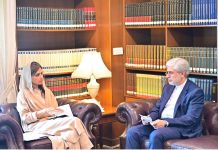
James Parys, USAID regional director for Sindh and Balochistan, says the development of education as well as giving access to underprivileged students, especially girls, to education are advantageous for both the US and Pakistan.
He said this at a roundtable virtual seminar on the work and significance of the Sindh Basic Education Program (SBEP), a joint project of the USAID and the Sindh government, on Sunday.
Mr Parys said that he was impressed by the incredible work by the USAID and the provincial School Education and Literacy Department in the educational field, which would improve access and quality education for marginalized students across the province.
“This is a partnership program between USAID and Sindh government, through which we have put in place physical infrastructure,” he said, adding that these schools are sustainable and well managed run by private people.
Through the SBEP, the USAID is building 106 state-of-the-art schools in Sindh to benefit up to 80,000 students in 10 districts. So far, 73 schools have been completed and the remaining 33 are under construction.
Mr Parys mentioned that this kind of sanctified programs are exemplary, which shows how both countries can work together for the betterment of people. “Working in the field of education broadly is very crucial for both countries,” he said and added that “we have lots of common interests shared in the specific field of education.”
The USAID has also helped the government of Sindh pioneer the flagship public private partnership program in the form of Education Management Organizations to work with the private sector organizations to improve the operations of public schools and enhance students’ learning achievements.
The SBEP was launched in 2011 after heavy floods hit the province.
He said that after the devastated floods in most parts of the province, the USAID started a very active partnership with the Sindh government. “Community mobilization is very important for elevating the education and standard of education. USAID with the collaboration of the government of Pakistan is working actively in different parts of the country to boost the education system and to bring every child to school.”
Steven Susens, senior officer of development communication and outreach, said that the SBEP was the splendid and treasured program, which includes not only providing education to students but building school buildings and other educational infrastructure as well.
He said the USAID and Pakistani government had got a long partnership which profits people of the country in the field of education. This is one of the successive projects of the decade.
Lila Ram, Project Management Specialist in Education, said that the Article 25-A of the Constitution provides the right of education to all children and SBEP is a way forward to confer education to every child beyond color, caste and religion.
“A conducive and encouraging learning environment is one of the features of the SBEP, through which children get a comfortable and favorable atmosphere to join school and to get education,”he said.
He highlighted the issues as lack of functional toilets for girls, boundary walls and other necessities in the schools of rural areas in the province and said such facilities are being provided in the schools constructed under the SBEP.